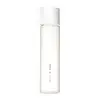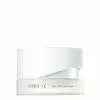Orbis U Lotion Versus Orbis U Gel Moisturiser
What's inside
What's inside
 Key Ingredients
Key Ingredients

No key ingredients
 Benefits
Benefits

 Concerns
Concerns

No concerns
 Ingredients Side-by-side
Ingredients Side-by-side

Water
Skin ConditioningButylene Glycol
HumectantGlycerin
HumectantDiglycerin
HumectantPropanediol
SolventPPG-24-Glycereth-24
EmulsifyingPhenoxyethanol
PreservativeGlycosyl Trehalose
Emulsion StabilisingPEG-75
HumectantPolyglyceryl-10 Eicosanedioate/Tetradecanedioate
Skin ConditioningHydrogenated Starch Hydrolysate
HumectantMethylparaben
PreservativePEG-400
Emulsion StabilisingCarbomer
Emulsion StabilisingXanthan Gum
EmulsifyingPotassium Hydroxide
BufferingCentaurea Cyanus Flower Extract
AstringentPrunus Persica Leaf Extract
EmollientTilia Cordata Flower Extract
Skin ConditioningZostera Marina Extract
Skin ConditioningWater, Butylene Glycol, Glycerin, Diglycerin, Propanediol, PPG-24-Glycereth-24, Phenoxyethanol, Glycosyl Trehalose, PEG-75, Polyglyceryl-10 Eicosanedioate/Tetradecanedioate, Hydrogenated Starch Hydrolysate, Methylparaben, PEG-400, Carbomer, Xanthan Gum, Potassium Hydroxide, Centaurea Cyanus Flower Extract, Prunus Persica Leaf Extract, Tilia Cordata Flower Extract, Zostera Marina Extract
Water
Skin ConditioningGlycerin
HumectantDiphenylsiloxy Phenyl Trimethicone
Skin ConditioningDimethicone
EmollientButylene Glycol
HumectantHydrogenated Lecithin
EmulsifyingGlycosyl Trehalose
Emulsion StabilisingBehenyl Alcohol
EmollientDiglycerin
HumectantPanthenol
Skin ConditioningHydrogenated Starch Hydrolysate
HumectantPropanediol
SolventPhenoxyethanol
PreservativeTrimethylsiloxysilicate
EmollientCarbomer
Emulsion StabilisingPEG-75
HumectantPotassium Hydroxide
BufferingXanthan Gum
EmulsifyingEthylhexylglycerin
Skin ConditioningAcrylates/C10-30 Alkyl Acrylate Crosspolymer
Emulsion StabilisingSodium Dilauramidoglutamide Lysine
HumectantCentaurea Cyanus Flower Extract
AstringentHypericum Erectum Flower/Leaf/Stem Extract
Skin ConditioningPrunus Persica Leaf Extract
EmollientTocopherol
AntioxidantZostera Marina Extract
Skin ConditioningWater, Glycerin, Diphenylsiloxy Phenyl Trimethicone, Dimethicone, Butylene Glycol, Hydrogenated Lecithin, Glycosyl Trehalose, Behenyl Alcohol, Diglycerin, Panthenol, Hydrogenated Starch Hydrolysate, Propanediol, Phenoxyethanol, Trimethylsiloxysilicate, Carbomer, PEG-75, Potassium Hydroxide, Xanthan Gum, Ethylhexylglycerin, Acrylates/C10-30 Alkyl Acrylate Crosspolymer, Sodium Dilauramidoglutamide Lysine, Centaurea Cyanus Flower Extract, Hypericum Erectum Flower/Leaf/Stem Extract, Prunus Persica Leaf Extract, Tocopherol, Zostera Marina Extract
Ingredients Explained
These ingredients are found in both products.
Ingredients higher up in an ingredient list are typically present in a larger amount.
Butylene Glycol (or BG) is used within cosmetic products for a few different reasons:
Overall, Butylene Glycol is a safe and well-rounded ingredient that works well with other ingredients.
Though this ingredient works well with most skin types, some people with sensitive skin may experience a reaction such as allergic rashes, closed comedones, or itchiness.
Learn more about Butylene GlycolCarbomer is a polymer of acrylic acid. Its main role is to create a gel consistency.
A high amount of carbomer can cause pilling or balling up of products. Don't worry, most products contain 1% or less of carbomer.
Centaurea Cyanus Flower extract comes from the cornflower, Centaurea cyanus. The cornflower is native to Europe.
Cornflowers contain antioxidant and anti-inflammatory properties. It contains high amounts of anxiotidants such as Vitamin C. They also contain flavonoids and anthocyanins.
Folk medicine in European cultures used cornflowers to help treat eye inflammation.
Fun fact: Cornflowers were used to determine if love was returned. Young men would wear cornflowers and if the color faded quickly, it meant the love was not reciprocated.
Learn more about Centaurea Cyanus Flower ExtractDiglycerin is a humectant. It is derived from glycerin, which is naturally found in your skin.
As a humectant, it helps draw moisture to the skin from the air.
Glycerin is already naturally found in your skin. It helps moisturize and protect your skin.
A study from 2016 found glycerin to be more effective as a humectant than AHAs and hyaluronic acid.
As a humectant, it helps the skin stay hydrated by pulling moisture to your skin. The low molecular weight of glycerin allows it to pull moisture into the deeper layers of your skin.
Hydrated skin improves your skin barrier; Your skin barrier helps protect against irritants and bacteria.
Glycerin has also been found to have antimicrobial and antiviral properties. Due to these properties, glycerin is often used in wound and burn treatments.
In cosmetics, glycerin is usually derived from plants such as soybean or palm. However, it can also be sourced from animals, such as tallow or animal fat.
This ingredient is organic, colorless, odorless, and non-toxic.
Glycerin is the name for this ingredient in American English. British English uses Glycerol/Glycerine.
Learn more about GlycerinWe don't have a description for Glycosyl Trehalose yet.
We don't have a description for Hydrogenated Starch Hydrolysate yet.
We don't have a description for PEG-75 yet.
Phenoxyethanol is a preservative that has germicide, antimicrobial, and aromatic properties. Studies show that phenoxyethanol can prevent microbial growth. By itself, it has a scent that is similar to that of a rose.
It's often used in formulations along with Caprylyl Glycol to preserve the shelf life of products.
Potassium hydroxide is commonly known as caustic potash. It is used to fix the pH of a product or as a cleaning agent in soap. In cleansers, it is used for the saponification of oils.
Sapnification is the process of creating fatty acid metal salts from triglycerides and a strong base. During this process, Potassium Hydroxide is used up and is not present in the final product.
Using high concentrations of Potassium Hydroxide have shown to irritate the skin.
Learn more about Potassium HydroxidePropanediol is an all-star ingredient. It softens, hydrates, and smooths the skin.
It’s often used to:
Propanediol is not likely to cause sensitivity and considered safe to use. It is derived from corn or petroleum with a clear color and no scent.
Learn more about PropanediolPrunus Persica Leaf Extract comes from the leaves of the peach tree.
Peach leaves contain antioxidants such as ferulic acid.
As an emollient, peach leaves help soften and moisturize your skin. Emollients create a barrier on the skin to prevent moisture from escaping. This helps keep your skin hydrated.
Learn more about Prunus Persica Leaf ExtractWater. It's the most common cosmetic ingredient of all. You'll usually see it at the top of ingredient lists, meaning that it makes up the largest part of the product.
So why is it so popular? Water most often acts as a solvent - this means that it helps dissolve other ingredients into the formulation.
You'll also recognize water as that liquid we all need to stay alive. If you see this, drink a glass of water. Stay hydrated!
Learn more about WaterXanthan gum is used as a stabilizer and thickener within cosmetic products. It helps give products a sticky, thick feeling - preventing them from being too runny.
On the technical side of things, xanthan gum is a polysaccharide - a combination consisting of multiple sugar molecules bonded together.
Xanthan gum is a pretty common and great ingredient. It is a natural, non-toxic, non-irritating ingredient that is also commonly used in food products.
Learn more about Xanthan GumWe don't have a description for Zostera Marina Extract yet.